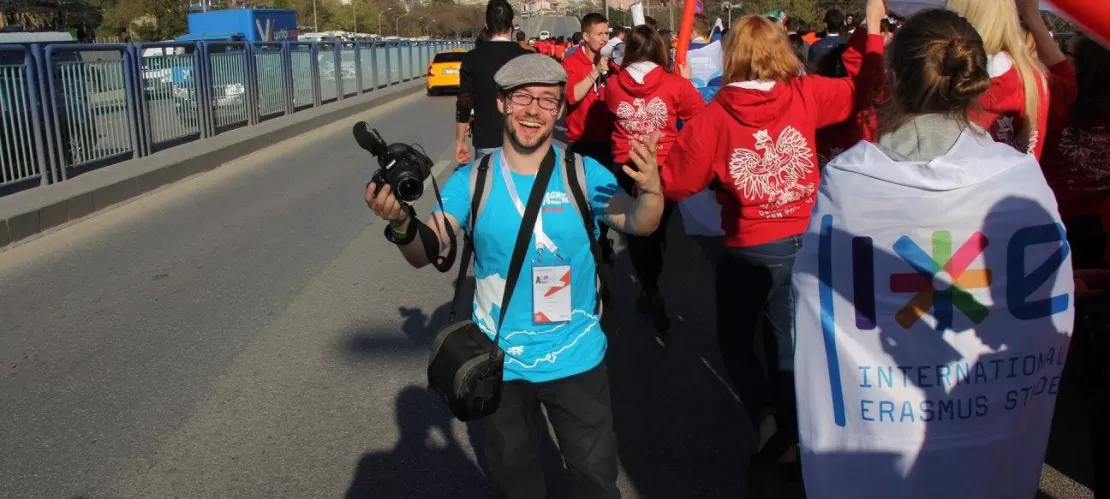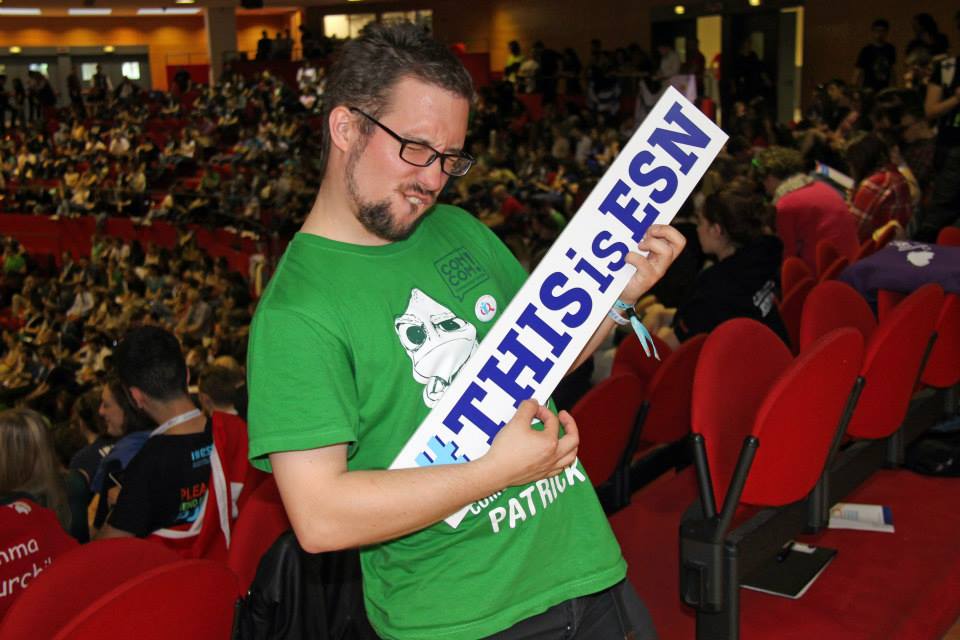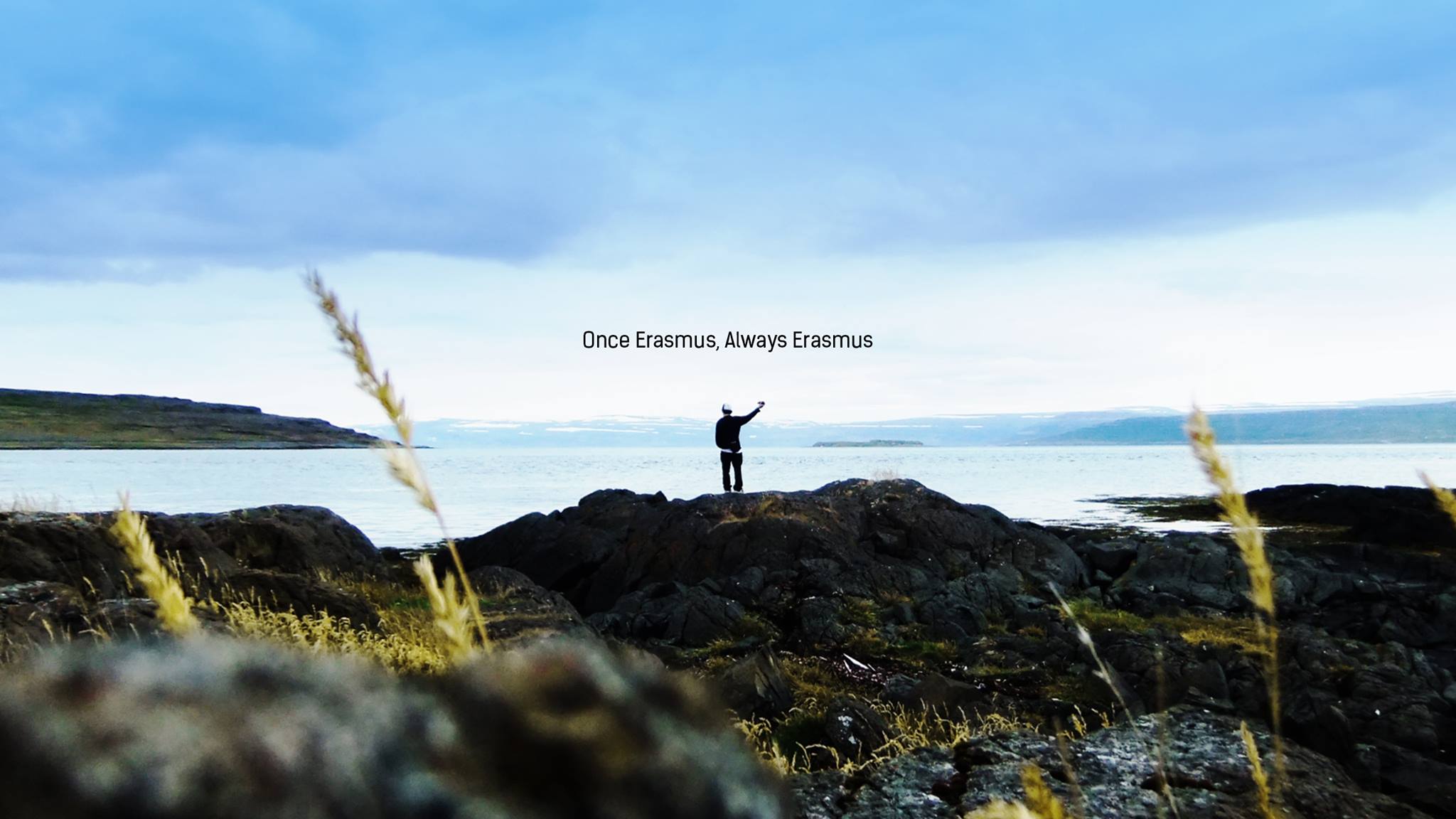
Meet Patrick
A passionate video maker and entrepreneur in the multimedia field, Patrick Doodt traces his roots back to the Erasmus Student Network, where he started volunteering in 2011. Patrick has been a video maker for ten years now! He started his career as a freelancer and then turned his talents into the Doodt Media Company, his very own business. If you’re a fellow ESN volunteer, like I am, you might just recognise his voice from a certain emotional ESN video.

The ESN Journey and the Volunteer Path
Back in 2011, a month after coming back from his Erasmus experience in Iceland, Patrick missed his mobility adventure so much that he decided to attend a welcome week event that his local section, ESN Dortmund, was organising for new incoming mobility students. During his time in Iceland, Patrick recorded everything about his Erasmus journey, so why not continue to do so after coming back home? We all know that our Erasmus doesn't end once we go back to our homes; it actually stays with us for a very long time. While being interviewed by Alkistis, a volunteer of the Communication Committee of ESN International, Patrick told her that he “wanted to show a little bit how it [the journey] continues after Erasmus because that's usually not talked about very much”. When approached by Markus, a volunteer from ESN Dortmund, during the welcome event Patrick was filming, the invitation to join the local section appeared. And so began Patrick’s ESN journey.
When talking about his first steps in the association, Patrick says he started by simply attending some of his local section’s events. He admitted that, in the beginning, he was still dealing with the “post-Erasmus depression”, and that demotivated him a bit to work on tasks that required bigger responsibilities and time dedication. However, everything changed on a trip to Amsterdam, where Patrick found himself stepping up due to a fellow volunteer’s absence. To cover for his colleague, Patrick helped by being more active in the trip’s organisation and aiding around 50 international students in having the best experience in Amsterdam with ESN Dortmund. After the trip, he started attending his local section’s meetings, signing up more for other tasks and gradually gaining more experience as a volunteer. By 2012, Patrick Doodt was already an active member of the Erasmus Student Network.
Nonetheless, Patrick’s journey as a volunteer extended to other associations apart from ESN. Since then, he’s volunteered at associations like the Federal Student Council of Philosophy in Constance, Germany, and Bodensey Consulting. This student consulting group helped Patrick develop and professionalise his skills. Currently, Patrick is the Vice-President of the Junior Chamber International (JCI) in Constance, as well as the Media Coordinator of the International Business Network in Stockach.

THE FOUNDATION
Video making might be a technical skill developed and learned over time by yourself, but the same can’t be said for the so-called soft skills we learn by volunteering.
As a member of the Communication Committee at ESN International, Patrick admits that he learned how to let go of his “artistic ego” when it came to facing feedback from others. He often viewed his peers at ESN as potential clients in his upcoming professional future, and by having this mindset, Patrick understood how to digest better feedback regarding his work and how to use constructive criticism in his favour.
Learning how to motivate and keep a team together, how to handle an association’s treasury and other responsible tasks demanded of a President of ESN Dortmund, Patrick unlocked a whole new skill that he’d later need for his future: leadership. The volunteers who’ve found themselves in leadership positions understand how hard it is to keep a team, especially of other volunteers, working together as one to accomplish a certain goal. When faced with these scenarios, I think we can agree that, regardless of the challenges, it all comes down to the bigger ESN purpose of us being students helping students. There’s no better way to motivate fellow volunteers.
In the end, Patrick has no doubts that ESN laid the foundation for his professional career: “ESN, and volunteering in general, is a very safe space to learn and especially make mistakes”.
Overcoming Challenges with ESN
Regardless of what we might think, Patrick’s academic background has nothing to do with video editing. Surprisingly, he studied Philosophy and Psychology in college. However, this different path through human sciences was never an obstacle to his career as a video maker and much of the reason why is due to the challenges he learned to overcome as an ESN volunteer.
Patrick recalls a specific and interesting challenge in March of 2013 when he attended his first Communication Committee Meeting in Brussels. While discussing the lack of content on ESN International’s YouTube channel, Patrick and a few other volunteers decided to get their hands dirty and change that. He remembers telling someone, “Hey, you have a microphone, I have a camera, let’s make a video!” This taught him that it is very important, whether it is as volunteers or professionals, to learn how to work with the tools we have at the moment, in other words, how to be self-sufficient. As there weren’t many members in ComCom at the time, Patrick learned to evolve in video editing by himself, realising that, even though he faced some challenges back then, the ESN spirit is “let’s do it” and we must carry on with what we have at our disposal.

"Attitude beats skill"
When we talk about the differences between the business and the volunteer worlds, one immediately comes to mind: money. However, Patrick talks about his experience in both and how, most of the time, “attitude beats skill”.
According to Patrick, in the business environment, it becomes pretty clear which workers have had volunteering experience and which haven’t. “There’s a different mindset”, says Patrick, “more of a proactive approach.” He believes soft skills are just as important as hard skills, and even though you might “know your craft” very well, in the long run, it’s your attitude that will prevail and make you stand out.
Patrick also highlights how ESN is incredibly professional, even though it’s just a student non-profit association. Many of our volunteers work at a very high level, in his point of view, and our productivity is remarkable. Sometimes, you can’t always see this happening in companies.
“It’s great you can make videos, but you need to know how to sell them”. Here’s where the skills gained at ESN played a major role for him since, without them, Patrick believes he wouldn’t have gotten as far in his career as he did. Patrick told Alkistis that organisational skills, perseverance, learning how to deal with stress, having a result-driven approach, building reliability, and handling your productivity are all important skills to have when you’re in a freelancer position.
When it comes to hard skills, to be a video maker, you need to know your way around professional equipment, such as cameras and microphones, and, of course, it’s also important that you learn how to handle a good video editing programme. Nonetheless, Patrick once again insists that, yes, these hard skills are relevant, but soft skills are just as important.
The Life of a Video Maker
From being a freelancer to owning his own business, Patrick has come a long way. At his job, he juggles both international and national projects, working with European institutions and higher education partners. He travels a lot to gather footage to later prepare it for the editing process, in order to then be able to sell it. Being his own boss also brings other responsibilities, such as handling the finances and accounting of the company, as well as networking within the area. When Alkistis asked him about the major challenges he had to face along the way, Patrick immediately recalled being confronted with a scandalous amount of bureaucracy and uncertainty regarding demand. It’s all fun and games until we need to roll up our sleeves and get down to business.
Patrick admits that there are certainly tough days during his job, but he has learned to develop the necessary emotional management for setting boundaries. “Some people wear ‘working crazy hours’ as a badge of honour,” he tells Alkistis, “and I think it's kind of stupid to sacrifice your mental health for the job”. It’s good to know when to grind yourself to work but, above all, when to take a break.
Advice from a Former ESNer
Pursuit excellence in your craft,” he tells us, “love what you do and let your passion drive you”. To young ESNers out there, Patrick reminds us that “the people around you are your allies, they’ll be your network for the future”.
On a more sentimental note, Patrick reflects on how lucky he is to wake up every morning and be excited about his job. He says that the greatest reward of his ESN journey was to have the life of his dreams.
